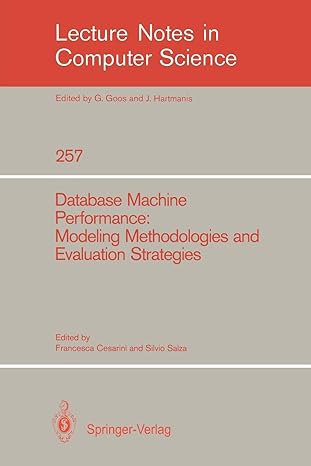Question
Complete the implementation of the find method. This method receives a parameter called key , and searches for it in the list. If key is
Complete the implementation of the find method. This method receives a parameter called key, and searches for it in the list. If key is not present in the list, the method must return -1. If key is in the list, the method must return the index of where key is located in the list. If key appears multiple times in the list, the lowest index value should be returned.
class LinkedListNode:
def __init__(self, item=None, next=None):
self.item = item
self.next = next
class LinkedList:
def __init__(self):
self.clear()
def clear(self):
self.head = None
self.tail = None
self.size = 0
def is_empty(self):
return self.size == 0
def append(self, item):
new_node = LinkedListNode(item=item)
if self.is_empty():
self.head = new_node
self.tail = new_node
else:
self.tail.next = new_node
self.tail = new_node
self.size += 1
def prepend(self, item):
self.head = LinkedListNode(item=item, next=self.head)
if self.is_empty():
self.tail = self.head
self.size += 1
def insert(self, idx, item):
if idx < 0 or idx > self.size:
raise Exception("Cannot insert -Index out of bounds")
elif idx == 0:
self.prepend(item=item)
elif idx == self.size:
self.append(item=item)
else:
new_node = LinkedListNode(item=item)
temp = self.head
for _ in range(idx - 1):
temp = temp.next
new_node.next = temp.next
temp.next = new_node
self.size += 1
def remove_first(self):
if self.is_empty():
raise Exception("Cannot remove - list is empty")
elif self.size == 1:
self.clear()
else:
self.head = self.head.next
self.size -= 1
def remove_last(self):
if self.is_empty():
raise Exception("Cannot remove - list is empty")
elif self.size == 1:
self.clear()
else:
temp = self.head
while temp.next.next:
temp = temp.next
temp.next = None
self.tail = temp
self.size -= 1
def remove(self, idx):
if self.is_empty():
raise Exception("Cannot remove - list is empty")
elif idx < 0 or idx >= self.size:
raise Exception("Cannot remove - Index out of bounds")
elif idx == 0:
self.remove_first()
elif idx == self.size - 1:
self.remove_last()
else:
temp = self.head
for _ in range(idx - 1):
temp = temp.next
temp.next = temp.next.next
self.size -= 1
def get(self, idx):
if idx < 0 or idx >= self.size:
raise Exception("Cannot retrieve - Index out of bounds")
elif idx == 0:
return self.head.item
elif idx == self.size - 1:
return self.tail.item
else:
temp = self.head
for _ in range(idx):
temp = temp.next
return temp.item
def __str__(self):
out_lst = []
temp = self.head
while temp:
out_lst.append(str(temp.item))
out_lst.append(' ')
temp = temp.next
return ' '.join(out_lst)
def find(self, key):
# YOUR CODE GOES HERE
return -1
Step by Step Solution
There are 3 Steps involved in it
Step: 1

Get Instant Access to Expert-Tailored Solutions
See step-by-step solutions with expert insights and AI powered tools for academic success
Step: 2

Step: 3

Ace Your Homework with AI
Get the answers you need in no time with our AI-driven, step-by-step assistance
Get Started


